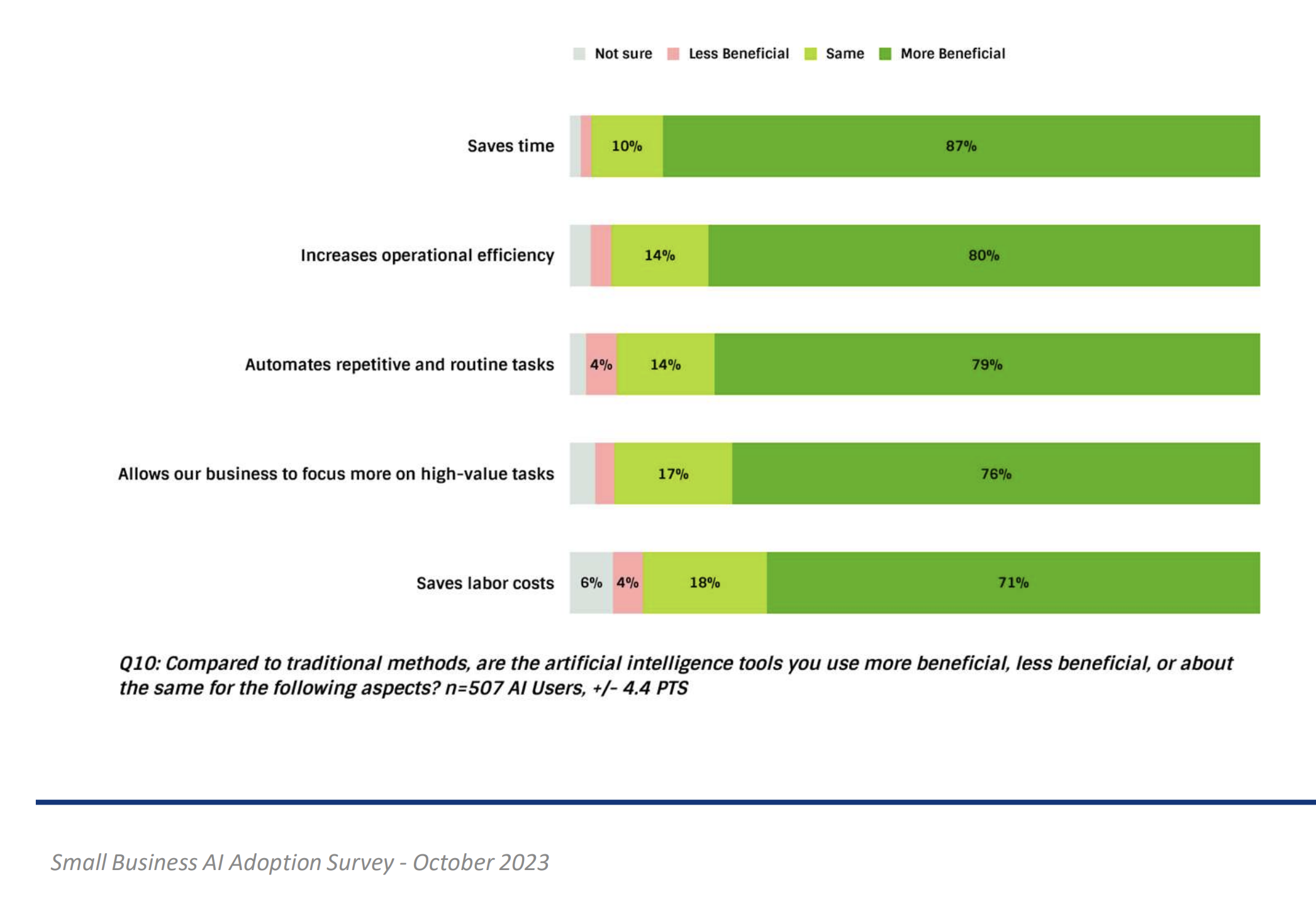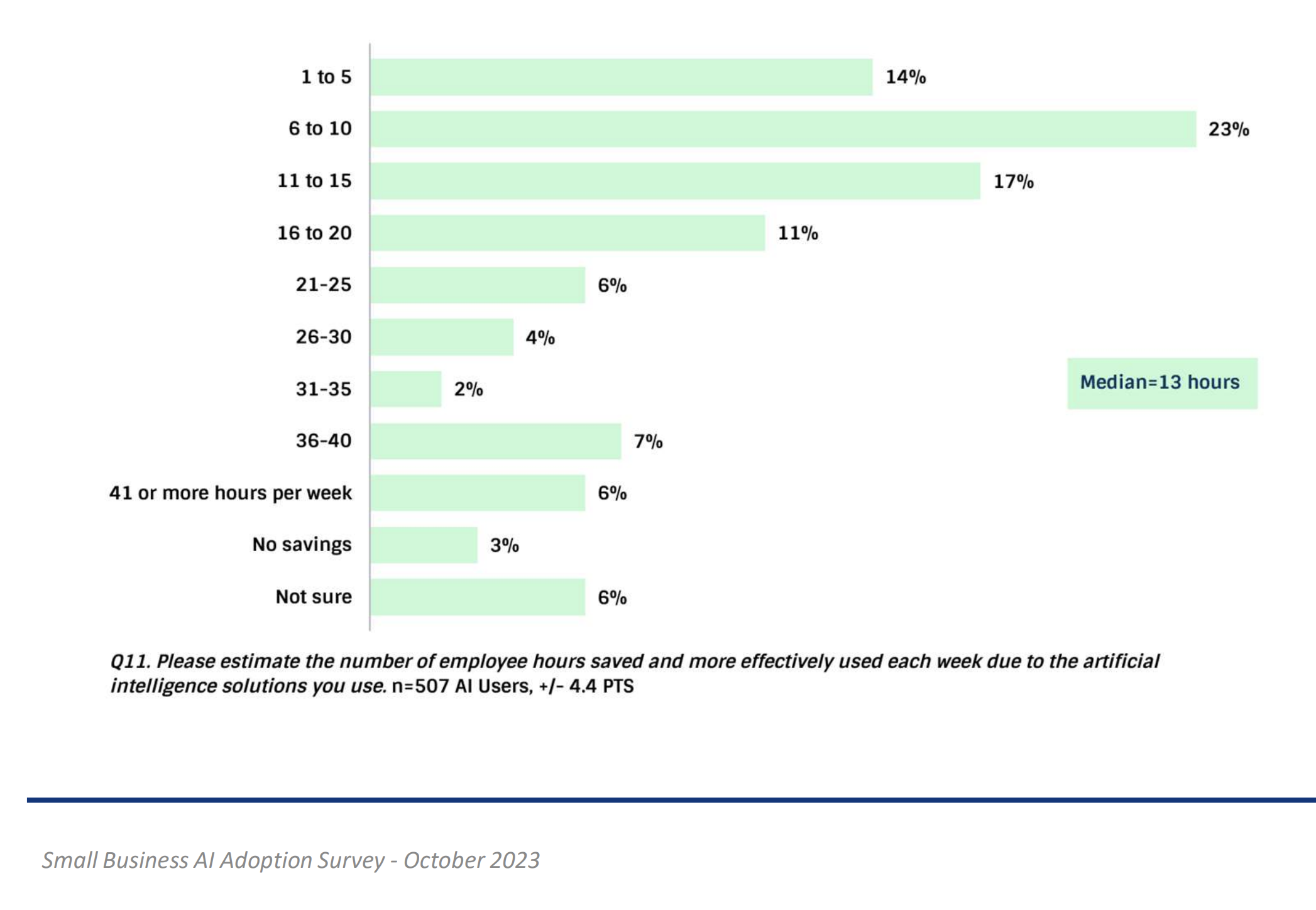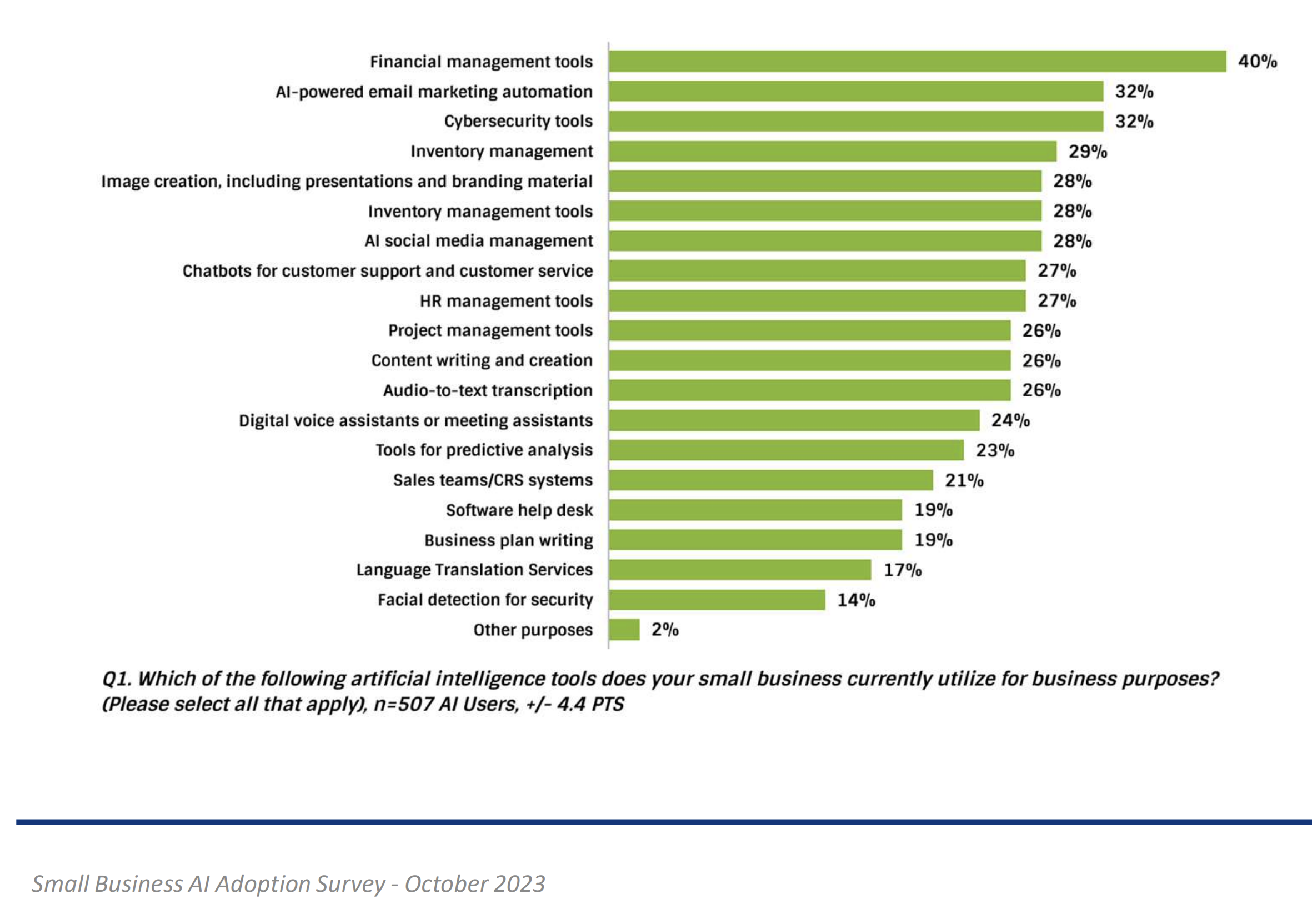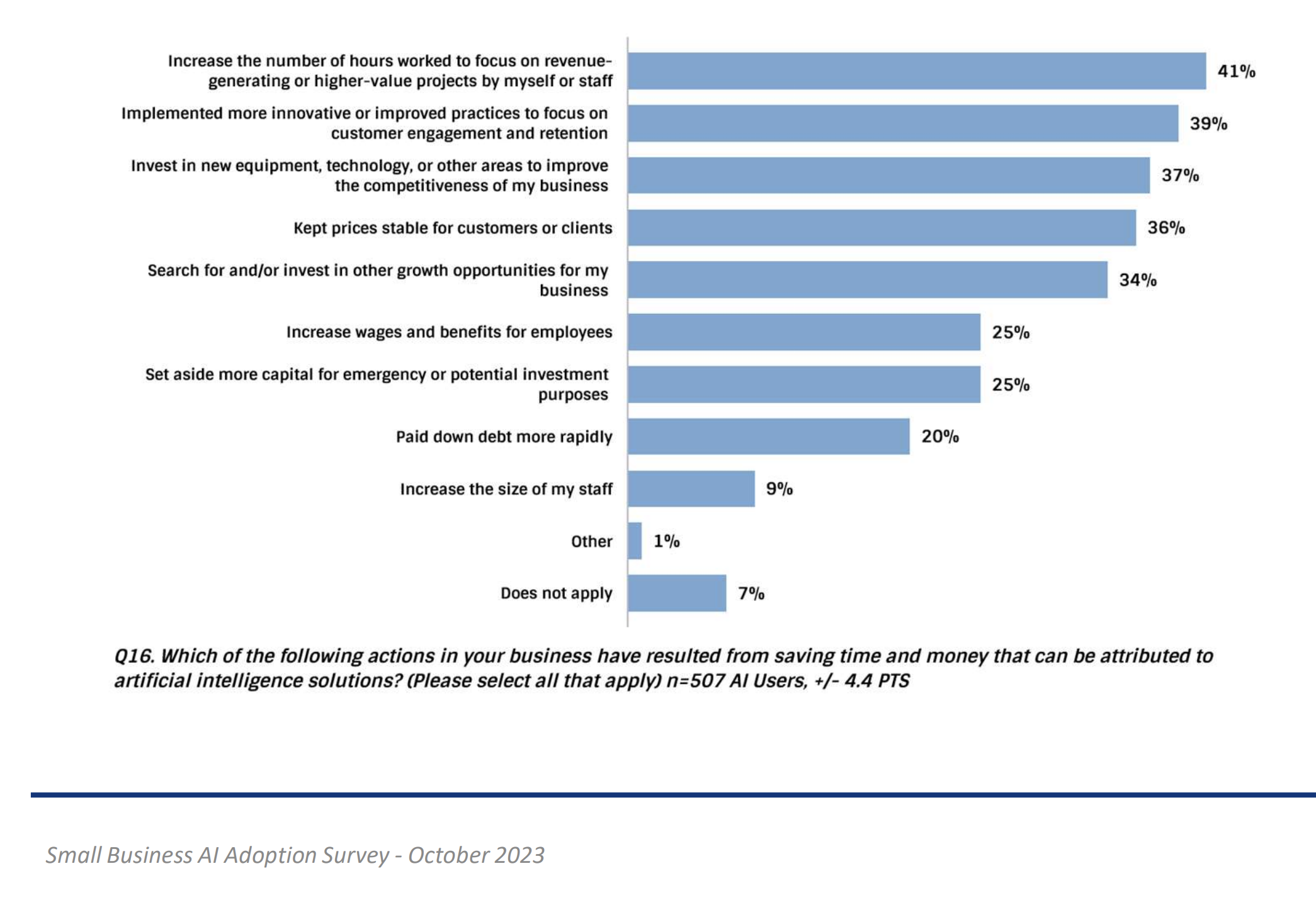
Artificial Intelligence
Maximizing Business Growth with AI
Artificial Intelligence (AI) technology, despite being in the early stages of its developmental potential, has already begun to revolutionize the business world. With a multitude of applications ranging from voice and AI-powered assistants to advanced chatbots and sophisticated facial recognition for security and fraud detection, AI solutions are significantly influencing businesses of all sizes across various sectors.
This transformative technology is a catalyst for business growth, as numerous companies are now leveraging AI to analyze client needs, enhance marketing campaigns, and optimize costs. The impact of AI in business is profound and continuously evolving, offering an array of opportunities for innovation and efficiency.
The Case for Small Businesses
The Small Business and Entrepreneurship Council (SBEC) Survey of October 2023 reveals that small businesses are reaping substantial time and cost benefits from AI implementation. Time savings, efficiency, automation, and labor cost savings are key benefits of AI tools over traditional methods.

Of the small businesses surveyed, a median weekly savings of 13 employee hours was achieved by leveraging AI solutions

Data from this survey reveals that over one half of small businesses (54%) learned about AI's potential by way of peer referral or their own research.

The most commonly used AI applications include financial management, email marketing automation, and cybersecurity tools.

These savings are being strategically reallocated to drive growth and enhance various business aspects, such as:
- 41% of businesses redirect time saved by AI to higher-value tasks for themselves and their employees.
- 39% invest in AI tools to foster innovative customer engagement and retention strategies.
- 37% channel AI-derived cost savings into acquiring new technologies.
- 36% maintain stable pricing for customers despite inflationary pressures.
- 34% leverage cost savings to explore new growth opportunities.
- 25% utilize these savings to boost employee wages and benefits.
- 25% allocate these funds towards emergency reserves or other purposes.
- 20% apply these savings towards faster debt repayment.

This data underscores AI's role as a transformative tool for small businesses, not only in improving operational efficiency but also in empowering them to pursue broader strategic goals. This is achievable using the company’s online footprint of a wealth of data, which, when utilized effectively, can drive more informed business decisions. However, many organizations fail to capitalize on this resource; the challenge lies in the efficient collection, analysis, and application of vast data sets, which is often a complex and daunting task.
Leverage and Offer Your Data Effectively
Traditional data analysis methods have struggled to keep pace with the sheer volume of data generated in the modern market. In contrast, technologies powered by AI and Machine Learning (ML) have demonstrated their superiority in handling data analysis at an unprecedented speed, scale, and level of detail. As highlighted by Forbes, the synergy of AI and big data is transformative: automating up to 80% of manual tasks, 70% of data processing, and 64% of data collection activities. This fusion not only streamlines processes but also unlocks new potentials for organizational growth and efficiency.
Companies that harness their data effectively gain deeper insights into customer preferences. While general trends are evident, each customer interacts with products in their own unique way. By leveraging AI and customer data, businesses can offer personalized experiences tailored to individual interests.
Providing customers with services and products that align with their specific needs and interests is crucial for maintaining engagement. In the rapidly evolving market, the adoption of AI for such personalized user experiences is becoming increasingly important. Leading examples of this approach include tech giants like Amazon, Instagram, and Netflix, which utilize recommendation engines.
These platforms employ ML algorithms to analyze users' past interactions and predict their future interests in products or content. By assessing current viewing patterns and engagement levels, these algorithms enhance the user experience on content-rich websites. Given the abundance of options available, integrating personalized user experiences is not just beneficial but essential for businesses aiming to stay competitive and relevant.
Another bright success story of AI usage is how Airbnb has adeptly utilized AI to evaluate risks and effectively manage rental pricing.
Specific Opportunities for Firms to Unlock Growth
By leveraging AI into their existing products and operational workflows, firms can yield significant benefits in growth, as well as cost savings. Though some of these benefits may require investment or intentional planning within product or platform development roadmaps, they will likely yield exponential returns, notably as firms scale in users/customers, staffing, operation, budgets, and volume.
Some high-level benefits might include:
- Enhanced Efficiency and Productivity:
- AI-driven automation streamlines routine tasks, allowing teams to focus on more strategic and complex aspects of their work.
- Data-Driven Decision Making:
- AI empowers businesses to make informed decisions by analyzing large sets of data, uncovering patterns, and providing valuable insights.
- Personalized Customer Experiences:
- AI enables the customization of products and services based on individual customer preferences, leading to higher satisfaction and loyalty.
- Predictive Analytics for Forecasting:
- Businesses can leverage AI algorithms to forecast trends, demand, and market changes, helping them plan and strategize effectively.
- Cost Reduction and Resource Optimization:
- Automation through AI can lead to significant cost savings by reducing manual labor, minimizing errors, and optimizing resource allocation.
- Improved Customer Support:
- AI-powered chatbots and virtual assistants provide instant and efficient customer support, enhancing overall customer experience and reducing response times.
- Innovative Product Development:
- AI fosters innovation by facilitating the development of new, technologically advanced products and features that meet evolving market demands.
- Fraud Detection and Security:
- AI algorithms can identify and prevent fraudulent activities, enhancing the security of financial transactions and sensitive data.
- Supply Chain Optimization:
- AI helps optimize supply chain operations by predicting demand, managing inventory efficiently, and improving logistics.
- Competitive Advantage:
- Businesses adopting AI gain a competitive edge by staying ahead of industry trends, adapting quickly to changes, and delivering cutting-edge solutions.
- Employee Skill Enhancement:
- Integrating AI encourages employees to develop new skills, fostering a culture of continuous learning and adaptation to technological advancements.
- Scalability and Flexibility:
- AI systems are designed to scale with business growth, ensuring that operations remain efficient and effective even as the company expands.
- Real-time Insights:
- AI enables businesses to access real-time insights, allowing for quick adjustments to strategies and operations based on the latest data.
- Risk Mitigation:
- AI can analyze potential risks and identify areas of concern, helping businesses proactively address challenges before they escalate.
- Customer Acquisition and Retention:
- AI-driven marketing strategies can target potential customers more effectively and enhance customer retention through personalized engagement.
Example: AI Helps Minimize Risks for Airbnb Hosts
Since its 2007 inception, Airbnb has faced challenges, including a 2019 incident in a London suburb where a rental turned into a disruptive party.

A photo of damaged property. Tyler McBride

Source: https://twitter.com/bchesky/status/1190675126594879489
This led Airbnb to adopt AI-driven solutions for guest vetting. The company developed a tool, enhanced by its 2017 acquisition of Trooly, to assess guest trustworthiness by analyzing public data like social media and blogs and cross-referencing online profiles. High-risk guests undergo additional screening.
Airbnb's commitment to safety extends to conducting background checks within ten days for guests in the US and India. The company keeps the details of these checks confidential but allows for an appeal process for guests impacted by the checks. These measures aim to protect the Airbnb community, ensuring a safer and more reliable experience for both hosts and guests.
Airbnb's Smart Pricing Algorithms
Airbnb, recognizing the difficulty hosts face in setting optimal rental rates, introduced a machine-learning algorithm called Smart Pricing in 2015 to assist in this process. This tool, evolving from the earlier Price Tips, helps hosts navigate fluctuating market conditions, such as seasonal demand and special events, to avoid pricing too high or too low. Smart Pricing aligns with Airbnb's revenue model, which depends on booking fees, and has been shown to increase host revenue by 8.6% and decrease rates for guests by 5.7%, according to a 2020 study. However, the study also revealed disparities in adoption rates across different host demographics, suggesting a need for more inclusive strategies. Overall, Smart Pricing aims to benefit hosts, guests, and Airbnb itself by optimizing pricing efficiency through AI.

Conclusion
Leveraging your firm’s data can unlock new growth opportunities - from creating value by offering more personalized customer and employee experiences to capturing value with more efficient digital systems and processes. 2023 was a revolutionary year, inspiring firms to make “AI adoption” part of daily conversation, while 2024 will be the year of personalized user experience (UX) that are made possible by AI.
At Scalio, we are dedicated to crafting custom AI and ML solutions that empower businesses to optimize processes and enhance decision-making.
From designing and building medical platforms that leverage AI/ML to enable surgeons to review valuable insights from their surgery workflows and improve patient outcomes (Intuitive Surgical) to developing the world’s largest crowdsourced platform for genetic research (23andMe), to crafting intuitive frontend experiences that enable tech giants such as Google, Amazon, Intel and Nvidia to build advanced 3D models efficiently (SynthesisAI), our commitment is to deliver innovative AI and ML design and development services that drive operational efficiency and foster innovation across various business sectors.
Let your AI innovation journey be accelerated with the right AI consulting partner, that offers the right AI/ML services and capabilities, at the right time.
Learn more about how we design and build intuitive frontend solutions that utilize advanced data, AI, and ML models

We're at the forefront of change in the AI-ML industry. Having helped innovative clients across multiple industries, from MedTech and FinTech to Media and eCommerce, we know how to translate the unique needs of your product and users into transformative outcomes that achieve impact.
About Scalio
Scalio is a global digital product agency driving digital success in over 30 industries. Through expert engineering, strategy, and design, we build and scale platforms and digital experiences for global brands.
Learn more about our expertise in your industry.
_
If you have more questions or interest in meeting Scalio Leadership Team, feel free to reach out for a friendly follow-up!

Anton Bukarev
Director of Engineering
Email: anton@scal.io
LinkedIn

Joshua Lucas
COO | Managing Partner
Email: jlucas@scal.io
LinkedIn

Micah Lucas
CTO | Managing Partner
Email: micah@scal.io
LinkedIn

Bradley Greenwood
CEO | Managing Partner
Email: bradley@scal.io
LinkedIn

Lawrence Valenti
CCO | Managing Partner
Email: lawrence@scal.io
LinkedIn





